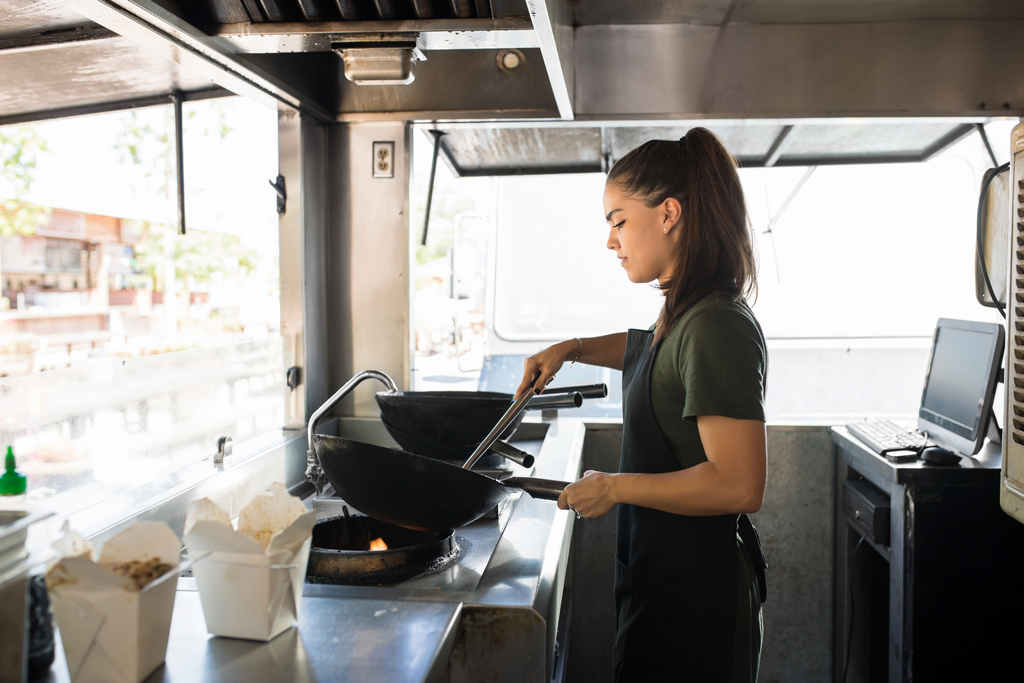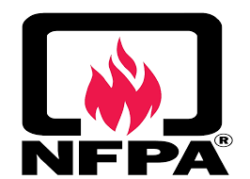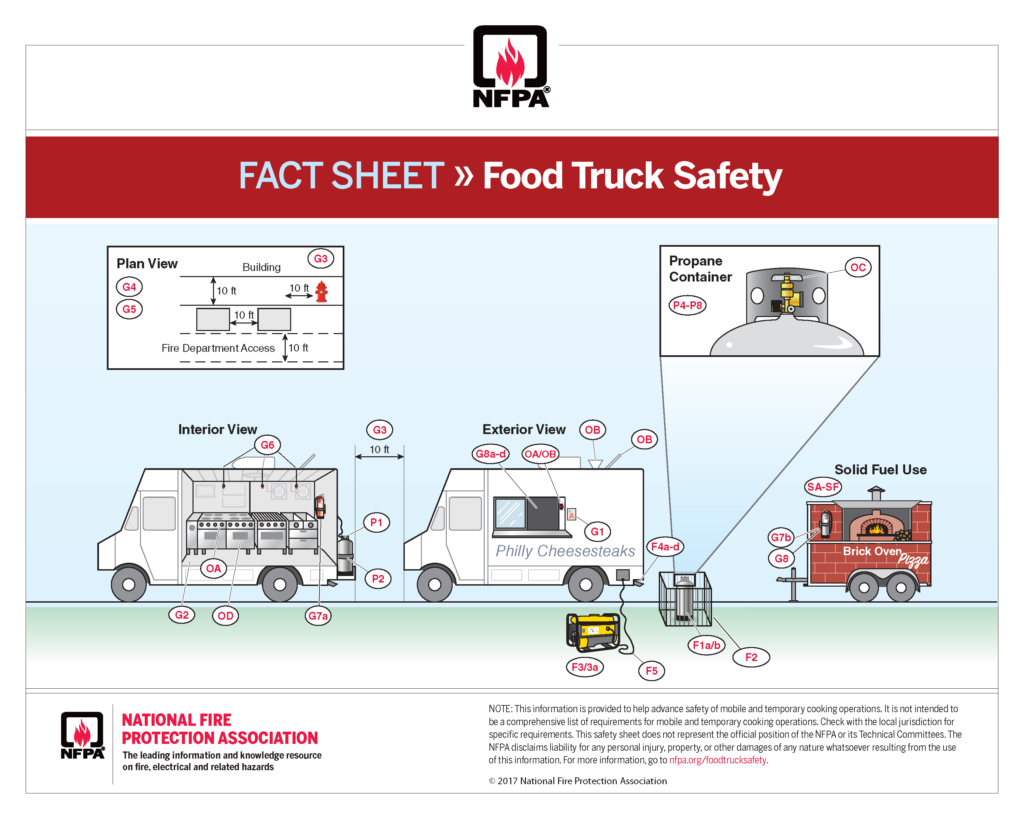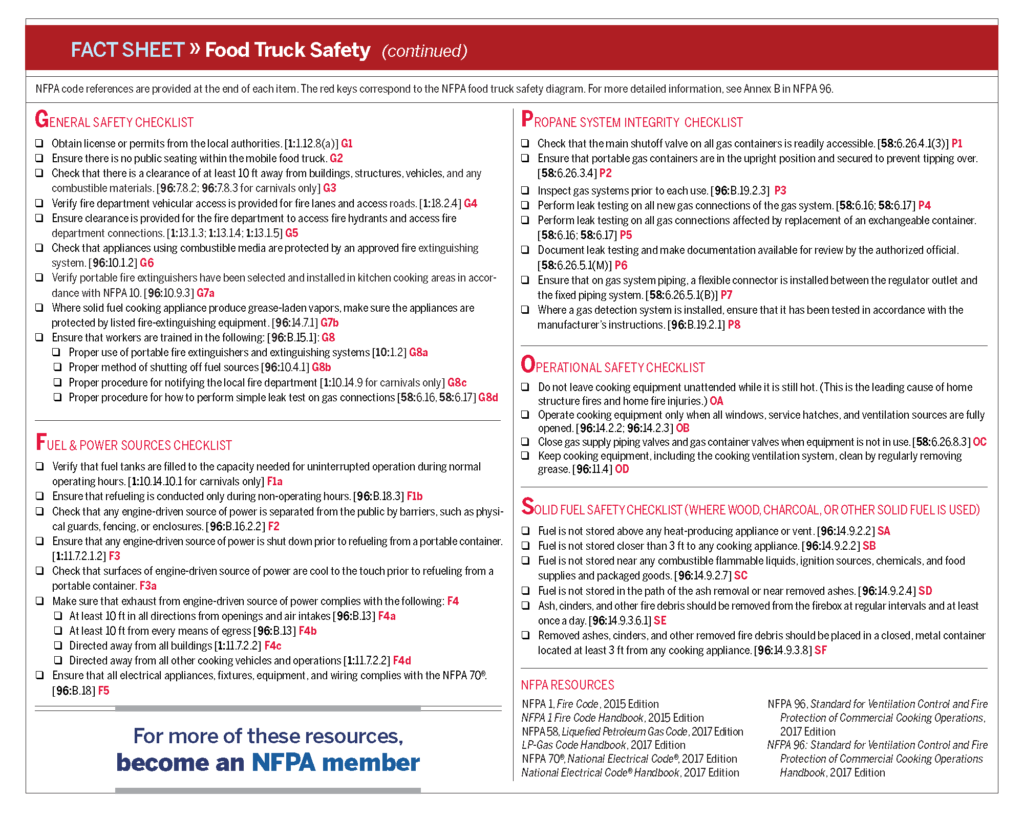Propane tanks are convenient and economical, which make them the preferred fuel source of food trucks. But, even though they are considered stable and safe, propane tanks still possess a certain degree of danger, just like any type of cooking fuel.

Fire Prevention Week
Fire Prevention Week, observed annually in October, raises awareness about fire safety to help ensure you are prepared in the case of an emergency. Fire Prevention Week is observed each year during the week in which October 9 falls in commemoration of the Great Chicago Fire.
Fire Prevention Week is also a great time for mobile food vendors to ensure the safety of their vehicles, themselves, and their customers by using propane and cooking flames in a safe way.
Use the hashtag #FirePreventionWeek to find out more about fire prevention.
Mobile Food Truck – Fire and Explosion Safety Concerns
General Concerns
- Does your jurisdiction require a license or permit to operate (e.g. local fire/health department)?
- Is cooking equipment attended at all times?
- Are all required ventilation openings open during cooking operations?
- Is the cooking hood/ventilation system free from grease?
- Is the vehicle parked always at least 10 feet from buildings, other vehicles, or combustibles?
- Is the vehicle parked so as not to block fire hydrants, fire lanes, fire department connections, exits, etc.?
- Are portable fire extinguishers charged, not obstructed, and in operating condition?
- Are portable fire extinguisher located near the cooking appliance, solid fuel storage, and any portable energy source (e.g. generator)?
- Is the hood fire suppression system charged and in operating condition?

Propane Concerns
- Is the propane system inspected prior to use?
- Are the propane tanks secured in an upright position?
- Are the propane tanks within their hydrostatic test date?
- Is the propane system in good condition, (i.e. no leaks, rust)?
- Has the propane system been leak tested?
- Has a leak test been performed when a new tank is installed, or a modification to the system has been made?
- Is documentation available for any leak test?
- Is the main shut-off marked, in plain view and easily assessable?
- Is the fuel supply shut off when not in use and while in transit?
- On gas system piping, is a flexible connector installed between the regulator outlet and the fixed piping system?
Electrical and Generator Concerns
- Is the electrical system and other equipment in good working condition?
- Are extension cords in good condition?
- Is the electrical system, including extension cords in accordance with the electrical code?
- Are generators placed at least 10 feet from buildings, structures, vehicles and combustibles?
- Are generator exhausts directed away from mobile cooking vehicle, vehicles, buildings, structures, exits and openings?
- Are generators protected from contact by the public?
- Are fuel supplies properly stored?
- When refueling are the generators shut down, engine cooled and then refueled?
Training Concerns
- Are employees trained in proper use of cooking equipment?
- Are employees trained in how to shut-off fuel sources (e.g. propane, generators)?
- Are employees trained in how to notify the local fire department in an emergency?
- Are employees trained in proper storage, handling and fueling procedures?
- Are employees trained in how to perform a leak test and when one is needed?
- Are workers trained in the proper use of portable fire extinguishers and hood extinguishing system?
- Learn about proper hygiene, cross contamination, cold and hot food safety, foodborne pathogens, and best practices to prevent foodborne illness.
- Food Manager Training & ANSI Certification - $99.00
- Food Handler Training - only $7.00!
- HACCP Training 16hr/4hr/1hr
- Enter Promo "train10off" at Checkout
Pipeline and Hazardous Materials Safety Administration (PHMSA) Propane Safety
The Pipeline and Hazardous Materials Safety Administration (PHMSA) offers an informative webinar to guide food truck operators on propane cylinder safety. Watch video here:
The Pipeline and Hazardous Materials Safety Administration (PHMSA) also offers a few things food truck operators should keep in mind regarding propane tank safety:
- Understand the markings on your propane cylinder. These may include symbols that show what type of tank you have, the original manufacture date, and the re-certification date.
- Know if your tanks need to be re-certified and understand the different kinds of cylinder re-qualification.
- The age of the tank can affect its performance. Ensure that your cylinders are not beyond their certified number of years.
- Be familiar to what propane smells like. Propane tank retailers offer scratch pads that can help your employees know the distinct odor of the fuel in case of leakages.
- Flammable liquids like cleaning agents or gasoline should not be near a gas-burning equipment. Fumes from these can get ignited by the pilot burner.
- Know where the gas lines are located inside your truck so that they do not get damage when moving kitchen appliance. Also, check the condition of connections to see if there are any leaks.
- Never attempt to fix a leak yourself. If you suspect a leak, call your supplier immediately! Any appliance connected to problematic cylinder must not be used until the leak is resolved.
National Fire Protection Codes for Mobile Food Vehicles
 Likewise until recently, there were not any National Fire Protection (NFPA) codes, standards, or guidelines to provide the minimum fire safety requirements for mobile food vehicles.
Likewise until recently, there were not any National Fire Protection (NFPA) codes, standards, or guidelines to provide the minimum fire safety requirements for mobile food vehicles.
After the 2014 Philadelphia food truck explosion killed a mother and daughter, the International Fire Marshals Association (IFMA) developed a task group to address this issue and submitted public input to:
- NFPA 96 – Standard for Ventilation Control and Fire Protection of Commercial Cooking Operations. Provides preventive and operative fire safety requirements intended to reduce the potential fire hazard of both public and private commercial cooking operations.
- NFPA 1 – Fire Code. Advances fire and life safety for the public and first responders as well as property protection by providing a comprehensive, integrated approach to fire code regulation and hazard management. It addresses all the bases with extracts from and references to more than 130 NFPA® codes and standards including such industry benchmarks as NFPA 101, NFPA 54, NFPA 58, NFPA 30, NFPA 13, NFPA 25, and NFPA 72.
NFPA – 2017 Edition
In February, the 2017 edition of NFPA 96 was released. This edition now addresses the minimum fire safety requirements for mobile/temporary cooking in new Annex Chapter B. The purpose of placing the language in a normative annex was to allow for the jurisdictions who do not currently adopt/enforce NFPA 96 to adopt solely this normative annex (without having to adopt the rest of NFPA 96) if that jurisdiction wanted to address mobile/temporary cooking specifically.
NFPA: Food Truck Fire Safety – Fact Sheet (PDF)
Download this fact sheet and print it out. It is intended to help advance the safety of mobile and temporary cooking operations.


NOTE: This information is provided to help advance safety of mobile and temporary cooking operations. It is not intended to be a comprehensive list of requirements for mobile and temporary cooking operations. Check with the local jurisdiction for specific requirements. This safety sheet does not represent the official position of the NFPA or its Technical Committees. The NFPA disclaims liability for any personal injury, property, or other damages of any nature whatsoever resulting from the use of this information. For more information, go to nfpa.org/foodtrucksafety.
Fire Safety Basics: Fire Prevention
- Install an automatic fire-suppression system in the truck. Because 57% of food service business fires involve cooking equipment, most municipalities require this equipment to be installed. These systems automatically dispense chemicals to suppress the flames and also have a manual switch. Activating the system automatically shuts down the fuel or electric supply to nearby cooking equipment. Have your fire-suppression system professionally inspected semiannually. The manufacturer can refer you to an authorized distributor for inspection and maintenance.
- Keep portable fire extinguishers as a backup. Class K extinguishers are designed for kitchen fires involving grease, fats and oils that burn at high temperatures. Class K fire extinguishers are only intended to be used after the activation of a built-in hood suppression system. Keep Class ABC extinguishers elsewhere for all other fires (paper, wood, plastic, electrical, etc.).
- Schedule regular maintenance on electrical equipment, and watch for hazards like frayed cords or wiring, cracked or broken switch plates and combustible items near power sources.
- Have your exhaust system inspected for grease buildup. The NFPA Fire Code calls for quarterly inspections of systems in high-volume operations and semiannual inspections in moderate-volume operations. Monthly inspections are required for exhaust systems serving solid-fuel cooking equipment, like wood- or charcoal-burning ovens.
Fire Safety Basics: Staff Training
Train your food truck staff these fire safety basics:
- Find and use a fire extinguisher appropriately. An acronym you may find helpful is PAST – pull out the pin, aim at the base, make a sweeping motion, (be) ten feet away.
- Clean up the grease. Cleaning exhaust hoods is especially important, since grease buildup can restrict air flow. Be sure to also clean walls and work surfaces; ranges, fryers, broilers, grills and convection ovens; vents and filters.
- Never throw water on a grease fire. Water tossed into grease will cause grease to splatter, spread and likely erupt into a larger fire.
- Remove ashes from wood- and charcoal-burning ovens at least once a day.
- Store flammable liquids properly. Keep them in their original containers or puncture-resistant, tightly sealed containers. Although a food truck kitchen is very small, you should attempt to store containers in well-ventilated areas away from combustible supplies, food, food-preparation areas or any source of flames.
- Tidy up to avoid fire hazards. Store paper products, linens, boxes and food away from heat and cooking sources. Properly dispose of soiled rags, trash, cardboard boxes and wooden pallets at least once a day.
- Use chemical solutions properly. Use chemicals in well-ventilated areas, and never mix chemicals unless directions call for mixing. Immediately clean up chemical spills.
Prepare An Emergency Plan
If a fire breaks out in your food truck, your staff must take control of the situation and all employees must safely exit the vehicle and lead customers to a point safely away from the truck.
- Be prepared to power down. Train at least one worker per shift how to shut off propane and electrical power in case of emergency.
- Have an evacuation plan. Designate one staff member per shift to be evacuation manager. That person should be in charge of calling 911, determining when an evacuation is necessary and ensuring that everyone exits the food truck safely. Ensure your staff knows where all of the exits are.
- Offer emergency training. Teach new employees about evacuation procedures and the usage of fire-safety equipment. Give veteran staff members a refresher course at least annually.
Food Truck – Fire Safety Additional information
- NFPA podcast on mobile food trucks
NFPA Journal’s Jesse Roman speaks to Jacqueline Wilmot, NFPA’s Staff Liaison for NFPA 96 - NFPA Journal article – “All Up in Our Grill”
by Jesse Roman, May/June 2015 - Presentation from NFPA’s 2015 Conference & Expo – Mobile Food Truck Regulation: Developing a Recipe for Success
Ronald Farr, Lead Regulatory Engineer, UL; R.T. Leicht, Chief Protection Specialist, State of Delaware; and Jacqueline Wilmot, NFPA Fire Protection Engineer
- WTCM radio interview in Traverse City, MI – Discussion of food trucks, and the standards of safety NFPA is working to create around these mobile eateries
Meredith Hawes, NFPA Public Education Regional Specialist, Jacqueline Wilmot, NFPA Fire Protection Engineer; and Chief Jim Tuller, Traverse City Fire Department
- City of Chicago fire safety permit consultant packet for mobile food vehicles (PDF, 459 KB)
- Food truck operation awareness flyer (PDF, 439 KB) – U.S. Department of Transportation
- Requalification Guidance for Propane Cylinders (PDF, 316 KB) – U.S. Department of Transportation
